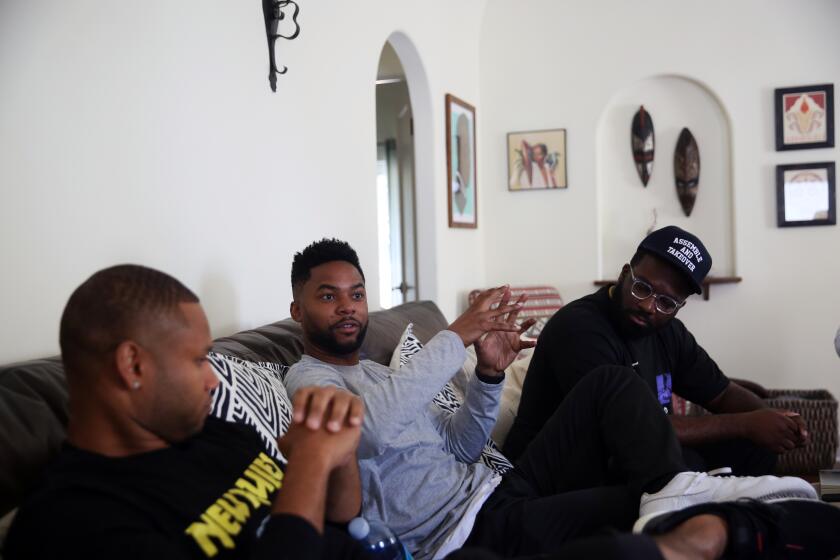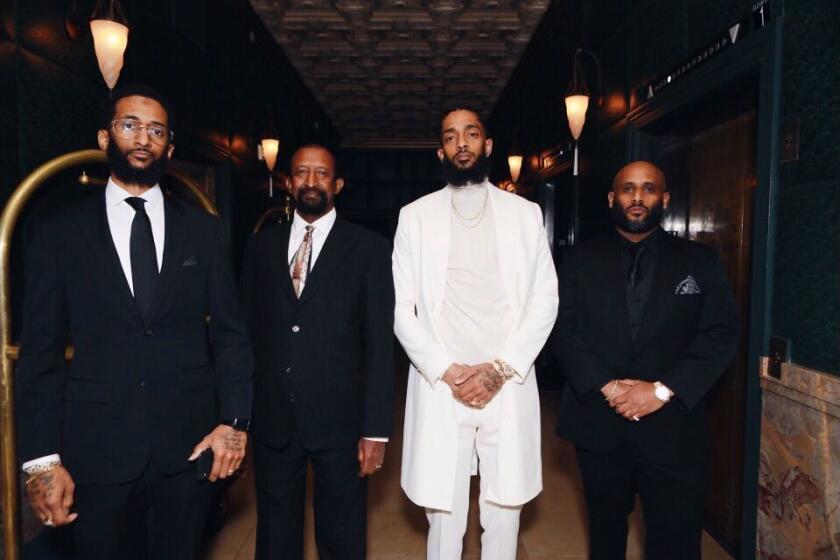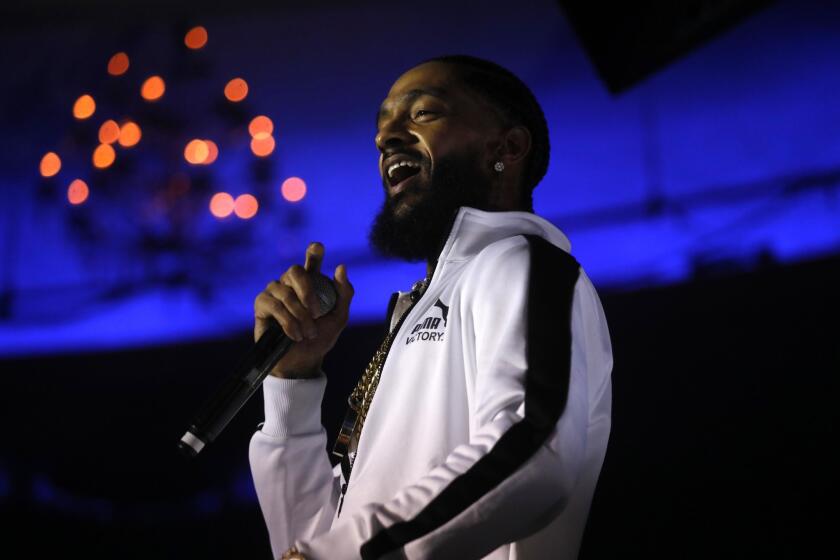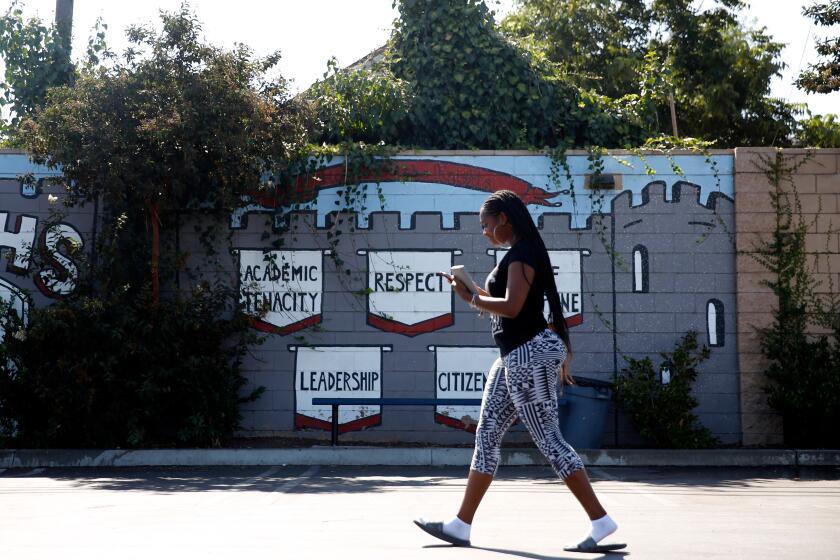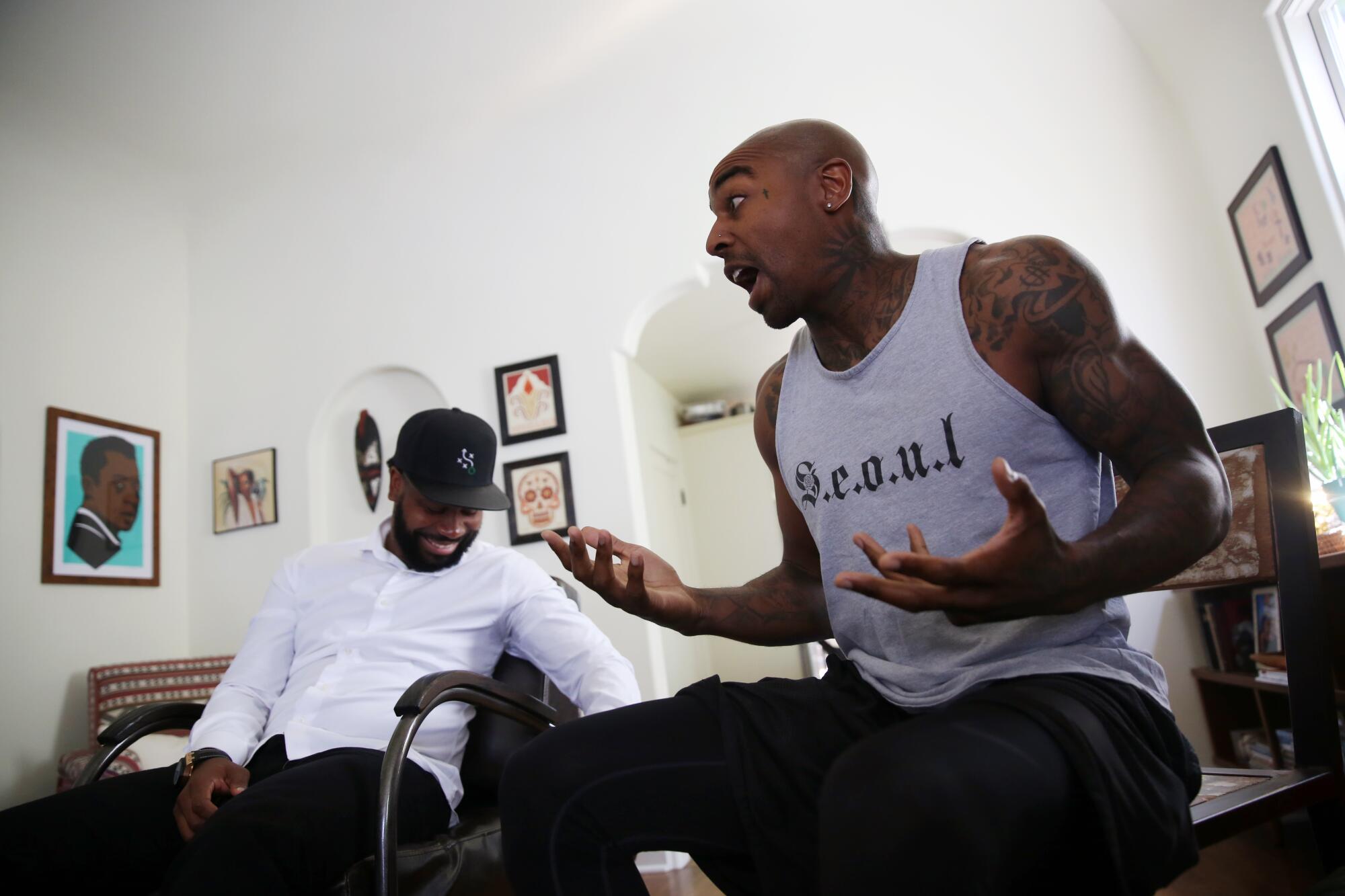
- Share via
“How many times as black men have we heard something before and had to bite our tongues?”
DeRon Cash, his tattooed forearms resting on his knees, curled a paperback revered by the late Nipsey Hussle in his hand. He didn’t really mean it as a question — and the other black men huddled around a coffee table in Boyle Heights knew not to answer.
Once a month, Cash and a group of men come together for The Marathon Book Club — one of several chapters across the country that were founded after Hussle was killed outside his South Los Angeles clothing store in March.
In the aftermath of his death, fans grasped for ways to honor him. Some made the pilgrimage to his shop off Slauson Avenue. Others painted his face in bright hues on the sides of buildings.
A 31-year-old fan from Wisconsin created a meme listing all of the books that Hussle had mentioned in interviews, songs and motivational messages that she had been compiling for years. It includes self-help bestsellers, cult classics and little-known books by black authors.
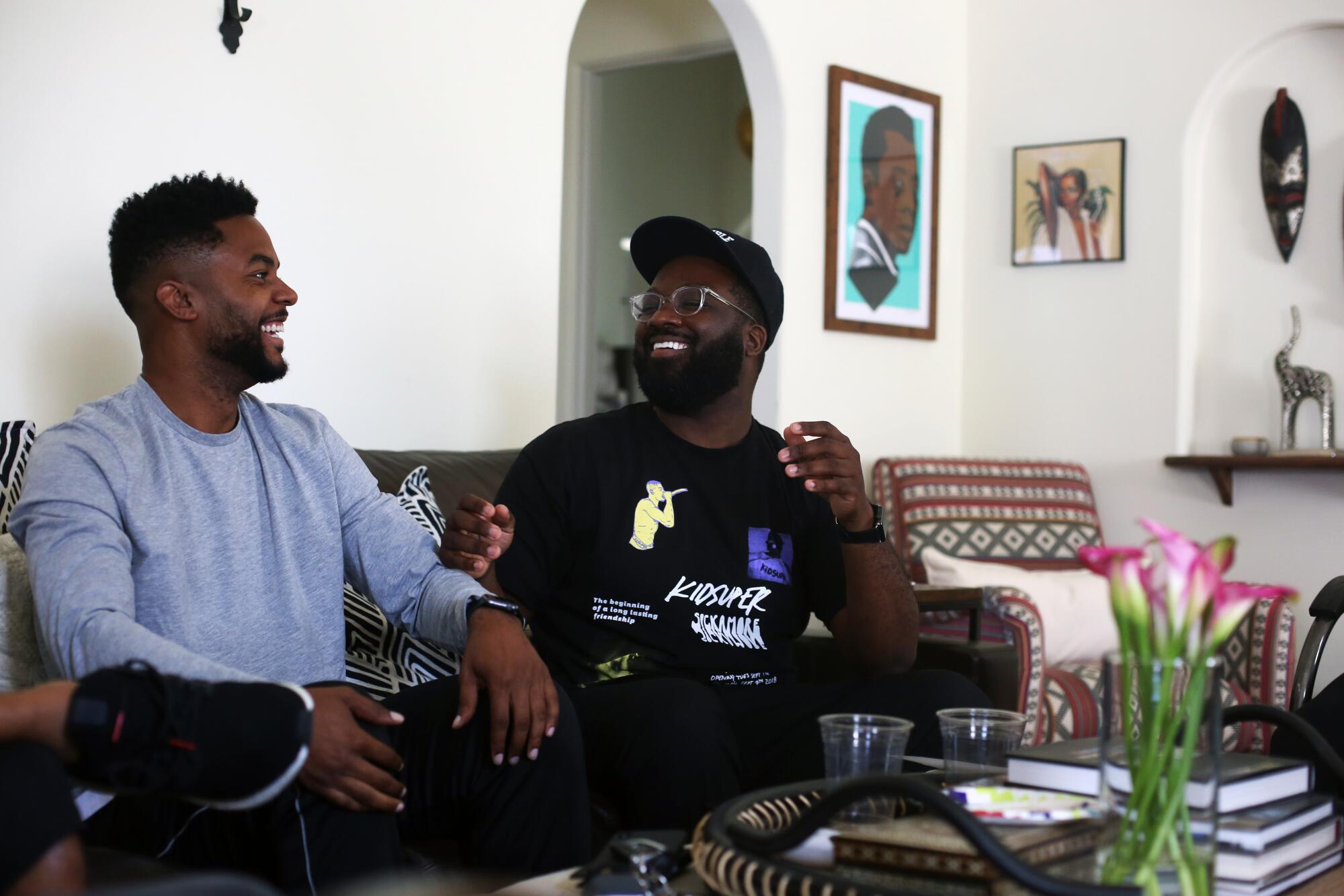
The list went viral.
Now, almost a year later, 74 black men and two Latinos make up the four chapters of The Marathon Book Club. They meet monthly in Oakland, New York and Washington, D.C., in addition to L.A., to discuss the books that motivated Hussle.
They include professors, entrepreneurs, corporate executives, investment bankers and at least one former athlete. Of those in Los Angeles, they have bachelor’s degrees, master’s degrees in business and doctorates from historically black colleges, private schools and state public universities.
A meme of Nipsey Hussle surrounded by a list a books led to a Wisconsin woman and a legion of fans looking to the rapper and activist for inspiration.
All those fancy titles and statuses are left at the door, though. There’s no posturing or pretensions. In this circle, the men can remove the masks that they have to wear in the world. Here, they can be themselves.
And on this warm summer morning, as so often happens, the book club quickly turned into therapy.
::
R.J. Harris opened with a confession: He didn’t finish the book.
But he had read enough to get the gist, and it got him thinking about the duality that black men face in life.
“We all have to learn how to [navigate spaces] whether we’re with our own people or we’re in spaces with prominently white people,” he said. “You have to master that skill to be successful in the real world.”
A choir of low “yeahs” backed him up.
The men in the group know what it’s like to be the only black voice in the room, like the protagonist in that month’s book, “The Spook Who Sat by the Door.”
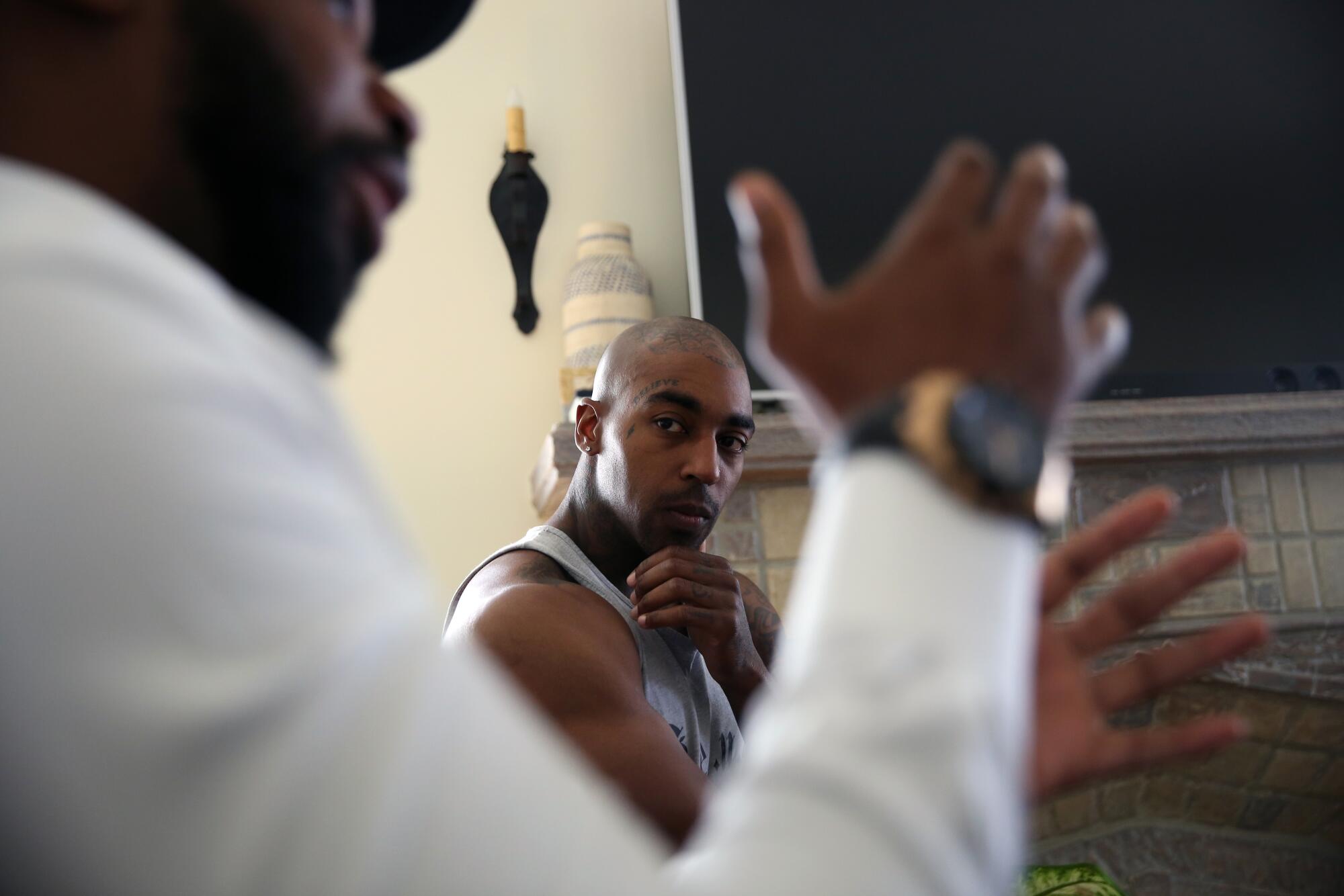
The underground classic inspired by author Sam Greenlee’s life follows former gang member Daniel Freeman as he works to become the nation’s first black CIA officer — or spook. Freeman eventually quits the agency, uses the spy tactics to mobilize street hustlers in Chicago and wages a war against the American government.
Hussle, born Ermias Asghedom, said in a 2018 interview that he was adopting the book’s name for his next album — an album he never got to make.
In some ways, the story paralleled Hussle’s own ascension from the Rollin’ 60s Crips street gang to a Grammy-nominated rapper and community activist who inspired a movement through his music and entrepreneurial messages. He used what he learned growing up in South L.A. to form his own record label, rebuild his Hyde Park neighborhood and create jobs.
“Finally wiggle out they mazes, find me out in different places, I’m the spook by the door, this the infiltration,” Hussle rapped in “Blue Laces 2.”
Harris said he related to the book’s protagonist, who found that the job as a CIA operative did not feed his soul. As a sports marketer, Harris had roles at the Madison Square Garden Co., worked with the Boston Red Sox and at the L.A. Football Club before leaving it all behind to launch a tech start-up, Otto.
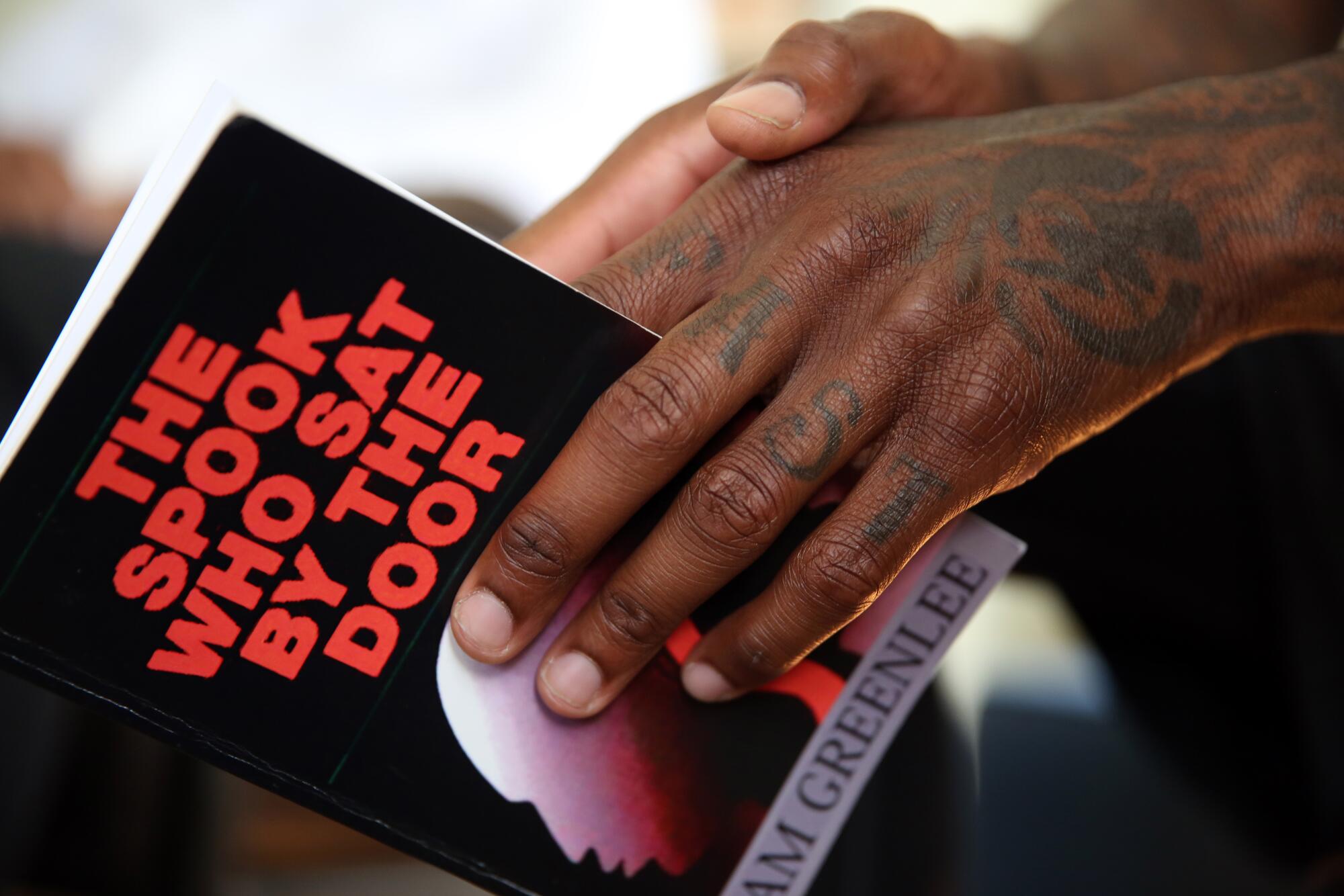
“My goals and objectives couldn’t be fulfilled in those spaces,” he said. “I didn’t feel full.”
Dion Pouncil leaned back in his leather chair. He too said he felt that while pursuing a career in baseball.
The programming pushed by society is that rapping, acting, singing or playing ball are the “only way to make money and how we can get out of the ’hood,” he said. But when Pouncil threw himself into the game, he realized he had little control over his own future. He was a player, not the owner. A worker, not the boss.
It wasn’t until he closed that chapter and used his connections to start his own company, the Playbook Network, did he find his true calling.
::
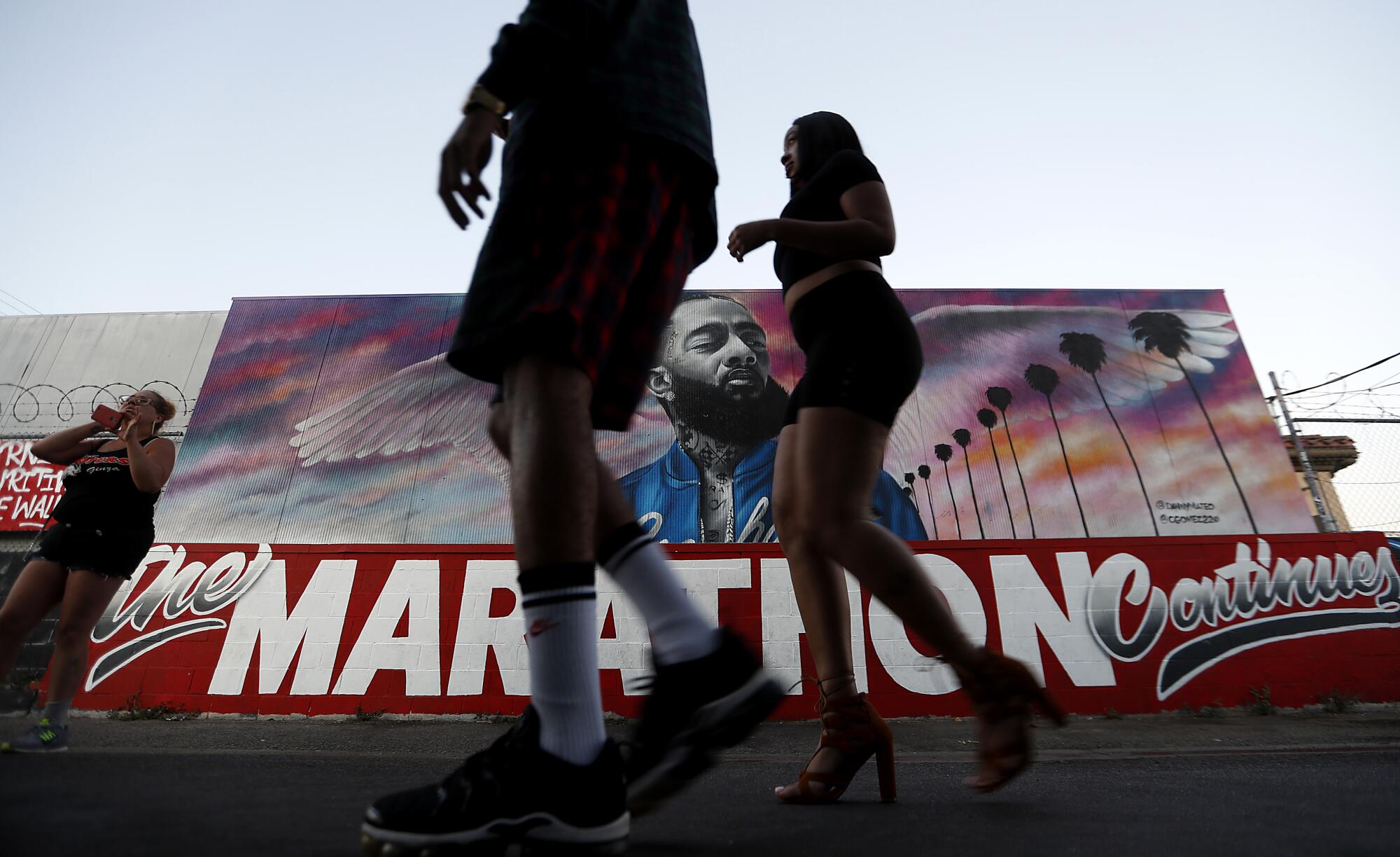
Hussle defined his purpose early in his career.
At Russell Simmons’ “Get Your Money Right” summit in 2006, he explained why he was avoiding the diamonds, flashy cars and other trappings synonymous with hip-hop.
“All of that is cool for the image,” said Hussle, then 21 years old and resembling a young Snoop Dogg. “But I’d rather invest in some real estate ... a real asset so I can take care of my people.”
Hussle found that the tools he needed to realize his dreams were inside books.
From the branding tome “Contagious: Why Things Catch On,” he got the idea to charge $100 for his mixtape, which caught the eye of Jay-Z. In the business book “The 22 Immutable Laws of Marketing,” Hussle found the inspiration for his life-is-a-marathon-not-a-sprint mantra that he later simplified into just “The Marathon.” In the decades-old “The Way of the Superior Man,” he said he learned how to harness his power as a black man.
Lauren London, Hussle’s longtime love and life partner, told The Times days after his death that he would sit in bed with headphones listening to books for hours.
“We read a lot of books together,” she said in between sniffs. “We inspired each other to be better versions of ourselves. He was a truth seeker and a truth speaker.”
The caller on the other end of Samiel Asghedom’s phone was panicked but clear.
London said one of the most memorable books in their personal book club was “3 Magic Words.” Hussle described it in an interview with Complex magazine as a book “about the projection of your thoughts into reality.”
Before his death, Hussle was a regular at Eso Won Books, a Leimert Park institution of black literature and culture.
It sold 24 copies of “3 Magic Words” last year. It didn’t sell any the year before.
“People want to connect and, in a sense, heal” by reading the books that Hussle read, said Eso Won co-owner Tom Hamilton.
On Hussle’s last visit in December 2018, he perused the shelves for books on Fred Hampton, the Black Panther activist. He told the clerk he was conducting research for an upcoming documentary on him. Hussle purchased more than $400 worth of books, including a $200 Jean-Michel Basquiat coffee-table book, “Sacred Woman” by Queen Afua, and several children’s novels.
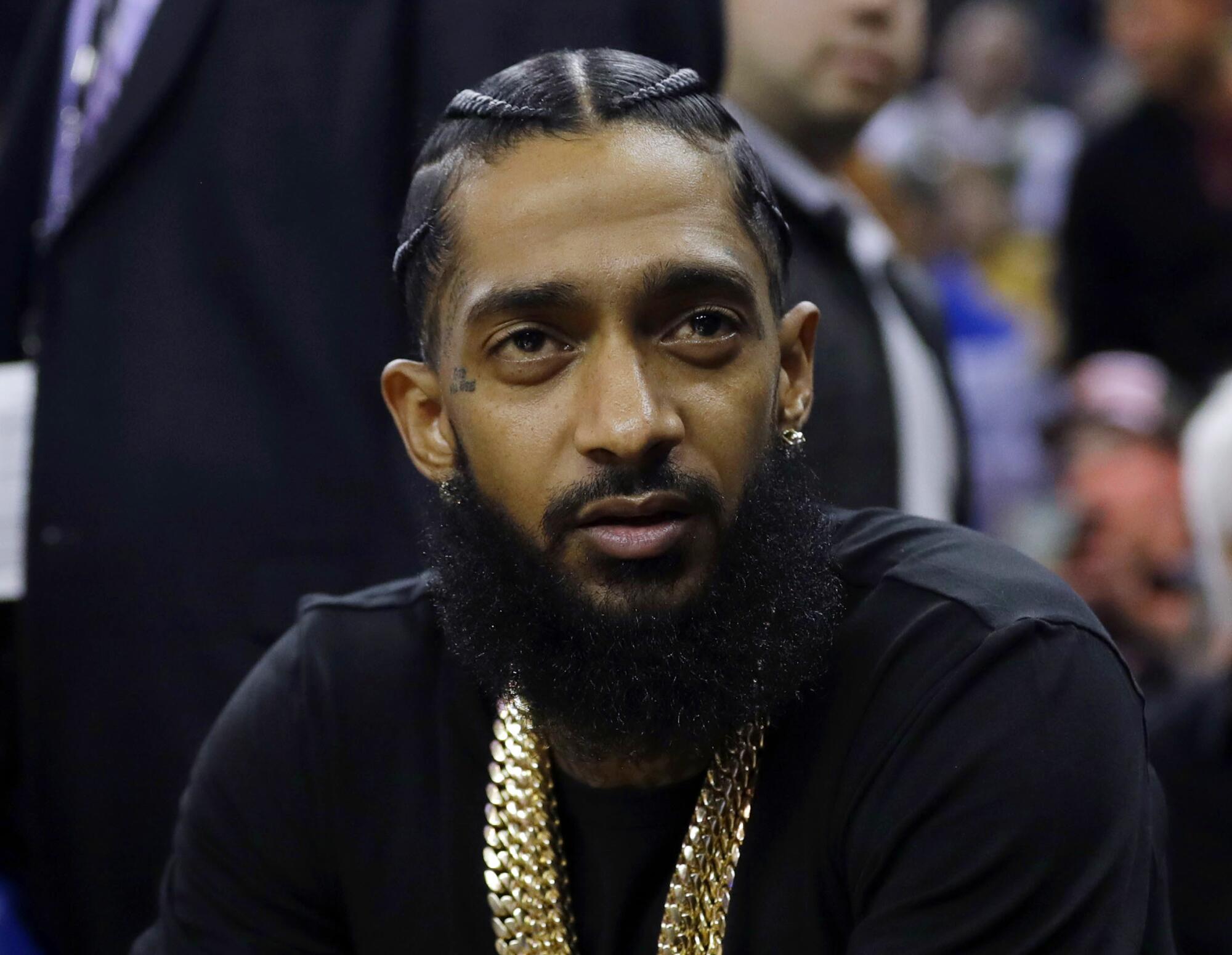
Now, patrons come to Eso Won with Hussle’s reading list in hand, and the books he revered are flying off the shelves.
Last year the store sold 150 copies of “Sacred Woman,” a self-help book about healing a woman’s spirit, up from 27 in 2018; 67 copies of “The Spook Who Sat by the Door,” up from 20 copies the prior year; and 30 copies of “The Way of the Superior Man,” up from a single copy the year before.
These books all educated and empowered Hussle — to release albums, start a record label and hire people with felony records to work at his shop, Slauson Tees, which later became The Marathon Clothing Store.
All of those were steps in a larger plan to revitalize his Crenshaw district in South L.A. — plans that were cut short when Hussle was gunned down outside his store in broad daylight on March 31.
Police have described the shooting as the culmination of a personal dispute. A fledgling rapper, Eric Holder, 29, has been indicted on one count of murder, two counts of attempted murder and other charges. The trial is set for March 2020.
::
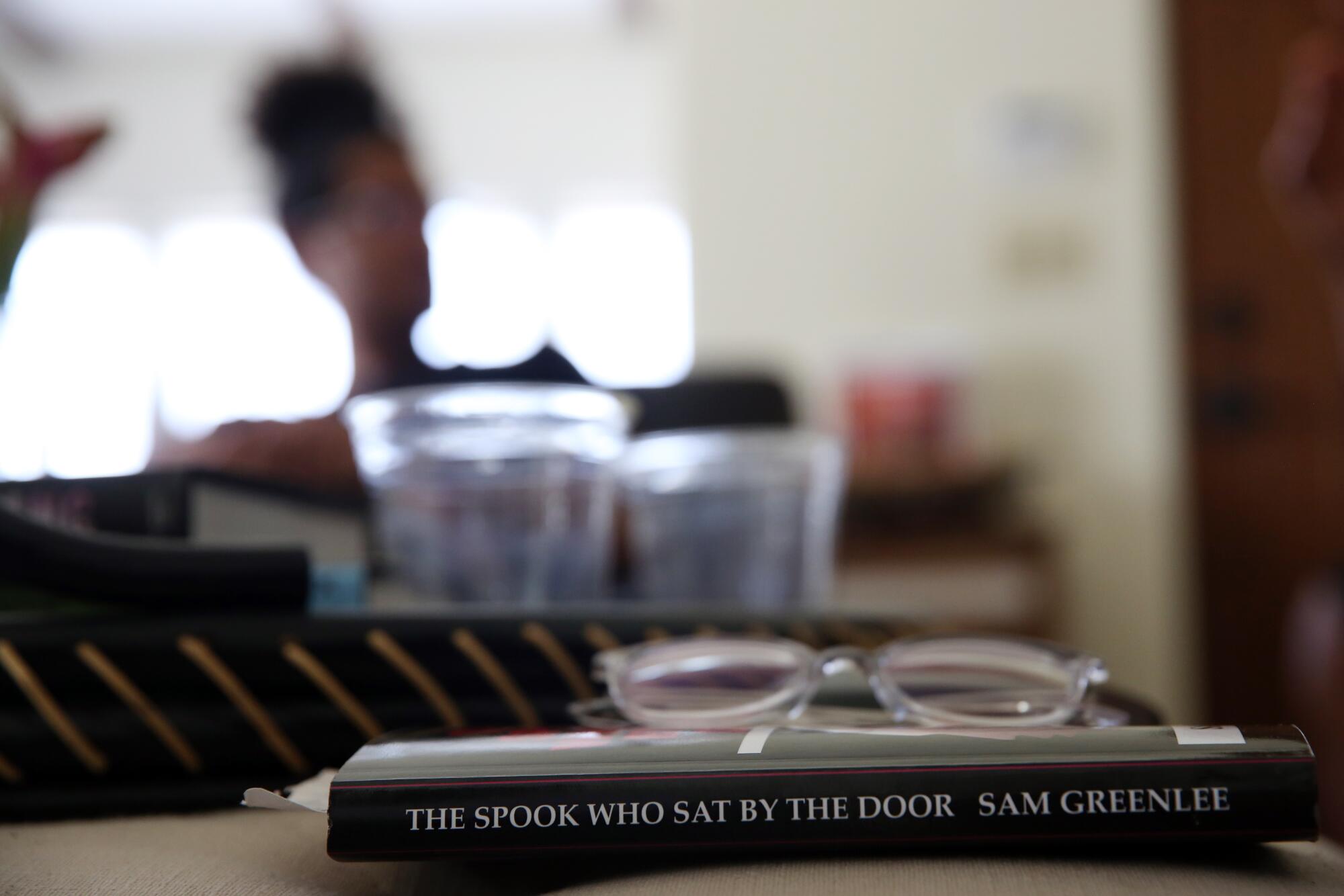
The smell of a tobacco and vanilla candle sweetened the room in Boyle Heights with a fragrant masculinity. Author James Baldwin, his likeness painted and mounted on a wall, peered down at the men gathered around the coffee table.
Rashad Drakeford, founder of The Marathon Book Club, gave voice to an internal battle. The 32-year-old holds a high-level position at a well-respected consumer technology company, but lately he’s been feeling like his dreams of helping under-served youths cannot be realized there.
“I’m not being heard in the way that I want to,” he said. “Now I’m at a place where, do I take all the skills, experiences and avenues and apply it to doing good for us? That’s a hard point to get to.”
“Mind if I ask, but what’s hard now?” Rahshiene Taha asked.
“Money, to be honest,” Drakeford said, voicing the fears of many aspiring entrepreneurs. “Uncertainty.”
Feeling the conversation had focused too much on him, Drakeford tried to change the subject. “This is not a therapy session for me.”
Charles H.F. Davis III, a professor at USC, interjected: “It’s for all of us.”
In the wake of the late rapper’s death in March , Atlantic Records and Puma will fund a foundation to honor Nipsey Hussle’s community roots.
Trauma, whether from racism or from witnessing or being the victim of crime, is often a daily reality for many black men, according to a 2018 study from researchers at Washington University in St. Louis. Yet because of a host of social and economic barriers, including religion, cultural misgivings, a lack of access to healthcare and a systemic bias among providers, black men are significantly less likely than any other demographic group to seek mental health treatment, according to Washington University researchers and the National Alliance on Mental Illness.
For years, black men rarely discussed mental health, even among themselves. But recently there has been a shift that has coincided with the maturation of hip-hop.
In 2016, Kid Cudi opened up on social media about his battle with depression. His honesty spawned the hashtag #YouGoodMan to encourage black men to talk about their mental health. Kanye West has shared his struggles with bipolar disorder. And Charlamagne tha God talks therapy, trauma and anxiety with some of hip-hop’s biggest stars on his nationally syndicated radio show, “The Breakfast Club.”
In L.A., Davis says he has been hearing more discussions about mental health in the barbershop and about toxic masculinity in the locker room. He sees The Marathon Book Club as a microcosm of those conversations.
For so long there has been a warped understanding of manhood, Drakeford said.
“It used to be how tough you are and how many women you could bag,” he said. “It’s OK to talk about issues, [to] be vulnerable and fail. That’s the true essence of manhood.”
Together at The Marathon Book Club, in the company of other accomplished, like-minded men at the top of their careers, they can share personal struggles that never make it on social media.
“Seeing brothers talking about the journey while they are in it makes you realize, ‘I’m not alone in this,’” Drakeford said. “I’m feeling the same thing.”
::
It was an hour and a half into the meeting before anyone mentioned Hussle’s name. The conversation had turned to sacrifice, and what one must do to move to the next level in their careers, relationships and other areas of their lives.
Cash moved his hands and tattooed forearms toward his right temple, where the word “believe” is written. He got the tattoo in 2015, inspired by the tattoo Hussle had with the word “prolific” along his hairline.
He spoke of waiting tables while he taking acting classes and waiting on his big break. Hussle did something similar, Cash insisted, as he pivoted from street hustler to a Grammy-nominated musician.
“When he really decided to lock in,” Cash said, “he had to fall back from the streets.”
Pouncil pointed out that personal development requires creating new habits. “Are you willing to die for it?” he asked, challenging the men’s will to become new versions of themselves.
The South L.A. rapper and entrepreneur’s death transformed the high school experience for 500 students at View Park Preparatory Charter.
Davis then spun Pouncil’s question on its head: “What if we’re already dying? Are you willing to live for it?”
The men examined their mortality. They discussed plans to live each day with purpose.
Drakeford pinched the bridge of his nose. He had a question for Taha, a family man who successfully pivoted from corporate life to that of an entrepreneur.
Do you start a business right now, when you’re at the stage in life when you want to buy a home, get married and have kids? Or, Drakeford wanted to know, do you wait?
Taha tells Drakeford he can have it all with the right life partner. It’s possible to do what you love, give back to the community and create generational wealth.
“What made us have patience is that we realized we’re going to be doing this forever,” he said. “That took all the pressure off of it. We’re now not worried about sprinting. We’re actually, funny enough, in a marathon.”
The room erupted in applause. Someone yelled, “OK, Nip!”
The men then packed up their belongings and returned to the outside world with the teachings of Hussle guiding them.
More to Read
Sign up for Essential California
The most important California stories and recommendations in your inbox every morning.
You may occasionally receive promotional content from the Los Angeles Times.
